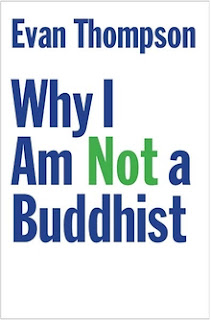Thompson is a philosopher who's spent considerable time in Buddhist communities, including conversations with the Dalai Lama. Even if not himself a Buddhist (as the title clearly states), he considers himself "a good friend to Buddhism."
Friday, November 20, 2020
The Buddha: Enlightened or Awakened?
Thompson is a philosopher who's spent considerable time in Buddhist communities, including conversations with the Dalai Lama. Even if not himself a Buddhist (as the title clearly states), he considers himself "a good friend to Buddhism."
Friday, November 13, 2020
"After Trump" by Don Heinz
Will this movement happen?
It’s now time to see, but one can pray for a more just, socially engaged, and faithful nation. And I suppose Heinz might add that it depends on those of us who call ourselves followers of Christ to decide what we will do. After Trump.
Friday, November 06, 2020
My Conversation with John Lennox about St. Clive
Today, I interviewed Doctor John Lennox, Oxford University mathematician and Christian apologist. He’s authored several books, such as Can Science Explain Everything? and most recently, 2084 Artificial Intelligence and the Future of Humanity. The upcoming film Against the Tide features Doctor Lennox’s thought.
This is one part of our conversation I really enjoyed, which I start in medias res...
Lennox
... a professor of Latin and Greek introduced me to the classical world, and so the humanities are as important to me as the natural sciences. Being a linguist fits with mathematics because it's a specialized language, and therefore the idea of clear explanation is very important.
C. S. Lewis once said, as you probably know, if a person cannot explain what they believe with words that people can understand either they don't believe it, or they don't understand it.
I'm constantly looking for ways or stories that aren't arbitrary, but enable us to get a grasp difficult concepts. Lewis was a genius.
Cootsona
Lewis is the greatest at this that I know of.
He had so many great images, and I was think you might be referring to the essay that lecture he gave to Anglican youth pastors, where he said there should be an exam for every ordination where you must translate things right into the common language.
And oh boy, we could really get lost in Lewis. I loved in the Oxford Socratic Club, his response to Doctor Pittenger, where he says, I have always wanted to speak for the people, right? And that means that I'm going to have to round off some edges, which is hard for academics.
I've given different presentations where I've talked to academics and said we need to learn from Lewis. Because we need to communicate, if we have great ideas, especially as people of Christian faith. But we have to realize there's going to be a loss because it's not going to sound as precise. Academics also like to hide sometimes behind their language.
Lennox
I fear they do. They do indeed.
Cootsona
You have a boldness about you, which I think is really compelling.
Lennox
A thought can be both clear and deep, and sometimes people have the impression that unless they use virtually unintelligible high flow language.
They're not really coming across as intellectuals, and a lot of it is human pride. Of course, yes, Lewis wanted to speak clearly and to articulate profound ideas at levels that people could grasp. Part of them and that really is a goal.
And he's a model for for me in that way.



